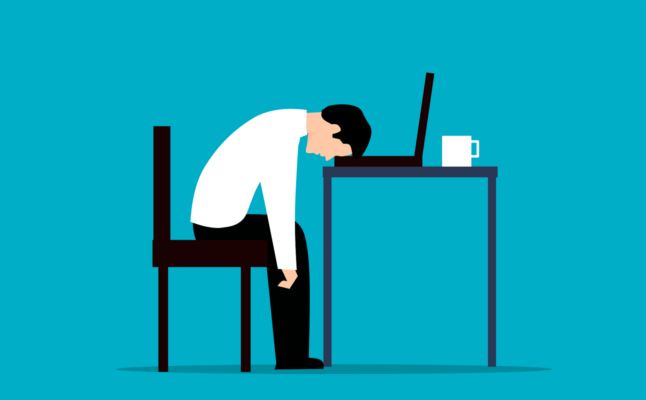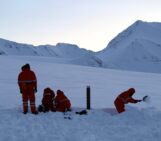
Friday the 10 October, was World Mental Health Day, a day that was founded by the World Federation for Mental Health (WFMH) in 1992. This year’s official theme focuses specifically on mental health in the work environment. So let’s take a look at what this means for the field of academia and the cryosphere specifically. With this post, we aim to not only raise awareness of the mental health crisis within the workplace, but to also focus on solutions and tools to help address these issues.
2024 Theme: mind your (working) head!
World Mental Health Day is celebrated each year under a different theme and aims to raise awareness for mental health issues around the world and mobilises efforts in support of mental health. In a statement by the World Federation for Mental Health (WFMH) about this year’s theme “It is time to prioritise mental health in the workplace!”, WFMH president Tsuyoshi Akiyama says:
Mental health issues, such as depression and anxiety, are pervasive in workplaces globally, impacting productivity, attendance, and overall performance. When left untreated, the staggering economic cost is estimated at US$1 trillion annually by the WHO. […]
World Mental Health Day 2024 will highlight various aspects of mental health at work, from workplace conditions and stress management to the importance of social inclusion and empowerment.
The goal is clear: to champion mental health in the workplace and build best practices that create cultures where workers have the potential to contribute productively and thrive. – Tsuyoshi Akiyama (WFMH)
These are very true and alarming words, but even more prevalent when it comes to academia where competition and job-insecurity add additional stress to employees, especially early career researchers (read more about these statistics in the EGU Mind Your Head blog series) .
Academic Mental Health – pronounced effects in ECRs
A fairly recent study showed that 32% of PhD students are at risk of having or developing a common psychiatric disorder, especially depression and that this is likely to further impact their future research career (Levecque et al., 2017). This does not appear to change when transferring to postdoc level. An article on Nature’s first-ever survey of postdoctoral scientists reveals that 51% postdocs who answered the survey are considering leaving science because of mental health related issues (Woolston, 2020).
These issues span from high pressure connected to their work and long hours to relatively low wages compared to research positions outside of academia and eventually also include pervasive job insecurity.
A postdoc can be a tipping point, it’s a time when career uncertainty collides with the stress of personal life. You reach that point and you have to ask yourself: Is it worth it? Can I even do this any more? – Ysseldyk et al. 2019.
Added level of difficulty for cryoresearchers?
A postdoc is also the time in someone’s life, where a lot of people would like to settle down somewhere instead of travelling around from job to job, country to country, moving house every few years – all things which add additional pressure.
For cryospheric research some of these challenges are even enhanced as e.g. research in these subjects are particularly susceptible to rapid fluctuations in funding opportunities due to national and global economic pressures (Figuerola et al., 2021). Additional mental health challenges for those working in the cryosphere also come from extended, often non-inclusive fieldwork in remote areas. Long months in difficult conditions away from family and friends can cause mental health challenges, both when you are away and on your return.

When mental struggles accumulates, several supporting systems, such as trustable colleagues, therapy and boundaries, can help us detangle the mental mess. Image by Mohamed Hassan from Pixabay.
Let’s look into perspectives and solutions!
According to the study by Levecque et al. 2017, there is not only a clear need for more empirical data on mental health issues within academia (especially for PhD students) but also more specific policies to improve the situation. They suggest that universities should facilitate management of work-family balance and workload, support supervision with regards to fruitful and constructive leadership and improve in offering clear and full information on job expectations and career prospects, both in and outside academia. When it comes to research policies these should be adapted to raising awareness to prevent mental health issues and adapt their rules with regards to research funding and employment conditions, which often add additional pressure to early career researchers (Levecque et al., 2017).
Some suggestions that can be introduced in everyday work life to try aid a better mental health environment.
- Encourage regular breaks. Within an office or research group, encourage taking a short walk, or going for a coffee. Normalise stepping away from your desk in the day.
- Take advice on good mental health practices from colleagues and mentors (and friends). A good mentor can make or break a time of hardship in any work setting.
- Form support networks on your career level. This is important for both the everyday office life, but also during field campaigns, where it can be essential to have a field buddy.
- Access mental health resources through apps, books, and resource databases at your institute
- Prioritise a healthy work-life-balance. It might be difficult, but there is no reason to feel guilty about putting yourself and your time before work! Yor health always comes first.
- Normalise saying “No”. Choose clear communication and understand that saying “no” to tasks is not a failure or rude, but might inspire your colleagues to also speak their boundaries. (Tip: EGU will organise a webinar on this topic very soon, so stay tuned!)
Have you already found or enjoyed ways to prioritise mental health at your workplace? Feel free to share your tips and tricks below in the comments with the community or on our social media channels. If any of the topics in this blog post have affected you, please reach out to your local mental health facilities or support staff.
Edited by Emma Pearce and Maria Scheel
Further Reading
- Check out the APECS Mental Health Database
- The EGU Tectonics and Structural Geology division blog feature a long-running series on the topic: Mind Your Head
- Our own EGU CR blog posts about making field work more inclusive and strategies and resources for inclusive field teams.
- Research paper on “Identity and Health Among Postdoctoral Women“ by Ysseldyk et al., 2019, Frontiers in Psychology 10
- Perspective article by early career researchers: “Shifting Perspectives in Polar Research: Global Lessons on the Barriers and Drivers for Securing Academic Careers in Natural Sciences”, Frontiers in Ecology and Evolution 9, 2021




